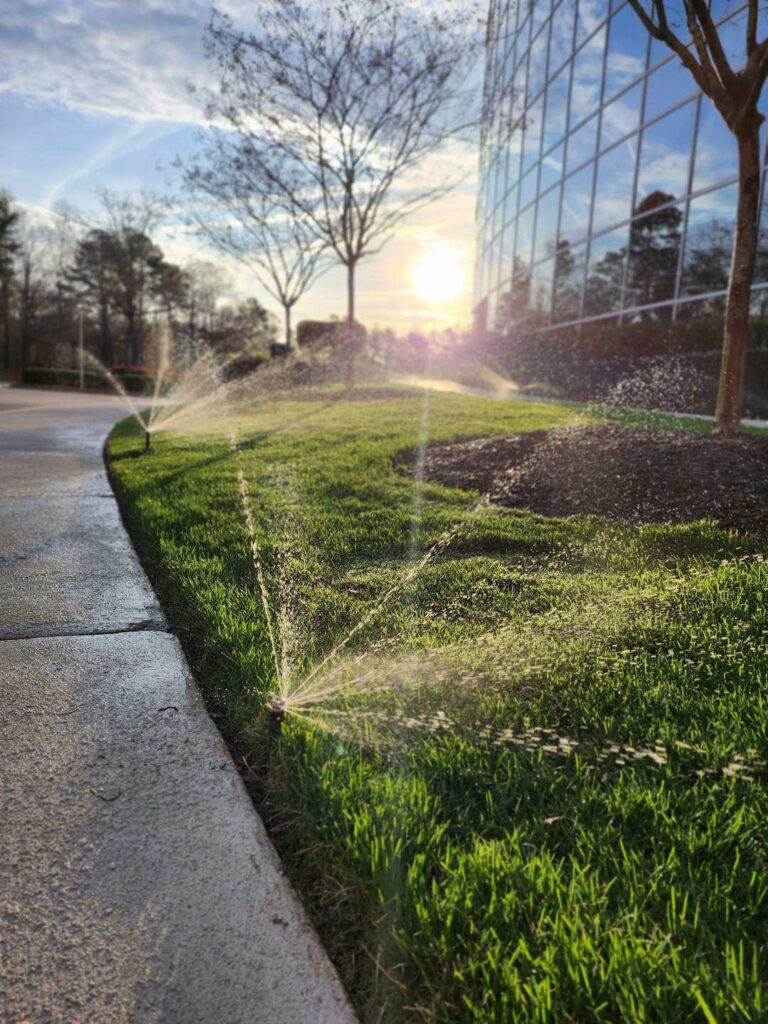By McKenna Rowles, Irrigation Manager
 As temperatures rise during the summer months, keeping your commercial property’s landscape lush and healthy can be a challenge. While maintaining a vibrant outdoor space is essential for enhancing curb appeal and creating a welcoming environment, excessive water usage can lead to skyrocketing utility bills. Fortunately, with a few smart strategies, you can maximize efficiency, conserve water, and significantly reduce costs. Here are five practical ways to save money on your commercial irrigation system this summer.
As temperatures rise during the summer months, keeping your commercial property’s landscape lush and healthy can be a challenge. While maintaining a vibrant outdoor space is essential for enhancing curb appeal and creating a welcoming environment, excessive water usage can lead to skyrocketing utility bills. Fortunately, with a few smart strategies, you can maximize efficiency, conserve water, and significantly reduce costs. Here are five practical ways to save money on your commercial irrigation system this summer.
 Conduct Regular System Audits
Conduct Regular System Audits
An irrigation system audit is one of the most effective ways to identify inefficiencies and address potential issues before they escalate. Over time, sprinkler heads can become misaligned, nozzles may clog, and leaks may develop—leading to water waste and increased expenses. A professional system audit involves evaluating each component to ensure that water is being applied evenly and efficiently across your landscape.
Pro Tip: Schedule a mid-season audit to check for any wear and tear caused by high summer usage. Promptly repairing damaged components can prevent costly water loss and improve system performance.
Utilize Smart Irrigation Technology
Upgrading to a smart irrigation system can drastically reduce water usage and lower utility bills. Smart controllers use real-time weather data, soil moisture levels, and site conditions to adjust watering schedules automatically. These systems ensure that your landscape receives the right amount of water at the right time—preventing overwatering and minimizing waste.
Pro Tip: Look for EPA WaterSense-certified smart controllers that have been proven to improve efficiency by up to 20%. Many systems also offer remote monitoring and control through mobile apps, allowing you to make adjustments from anywhere.
Adjust Watering Schedules Based on Weather
During the peak of summer, it’s easy to assume that your landscape requires more water. However, blindly increasing irrigation times can lead to overwatering, root rot, and unnecessary costs. Instead, tailor your watering schedule based on seasonal weather patterns and plant needs.
Pro Tip: Water during early morning hours (between 4 a.m. and 10 a.m.) when temperatures are cooler and evaporation rates are lower. Avoid midday watering, which can lead to significant water loss due to evaporation.
Incorporate Drip Irrigation in Key Areas
For landscaped areas with shrubs, flower beds, or trees, consider incorporating a drip irrigation system. Unlike traditional sprinkler systems that spray water over large areas, drip irrigation delivers water directly to the root zone, minimizing evaporation and runoff. This method not only conserves water but also promotes healthier plant growth by providing consistent moisture where it’s needed most.
Pro Tip: Use drip irrigation in mulched areas to reduce surface evaporation further and keep the soil consistently hydrated without oversaturating it.
Mulch to Retain Soil Moisture
Mulching is a simple yet highly effective way to retain soil moisture and reduce the need for frequent watering. A layer of organic mulch—such as bark, wood chips, pine straw or compost—acts as an insulating barrier that shields the soil from direct sunlight, reducing evaporation and keeping roots cooler during hot summer days.
Pro Tip: Apply a 2-3 inch layer of mulch around plants and trees to lock in moisture, suppress weeds, and improve soil quality over time. Regularly replenish mulch to maintain its effectiveness throughout the season.
By taking proactive steps to optimize your commercial irrigation system, you can significantly reduce water consumption, lower operational costs, and maintain a thriving landscape all summer long. Regular system audits, adopting smart technology, adjusting watering schedules, utilizing drip irrigation, and incorporating mulch are all proven strategies that promote water conservation and cost savings. Investing in these techniques not only benefits your bottom line but also demonstrates your commitment to environmental sustainability—a win-win for your business and the planet.
Learn more about our in-house commercial irrigation services